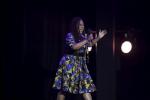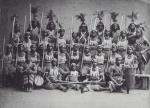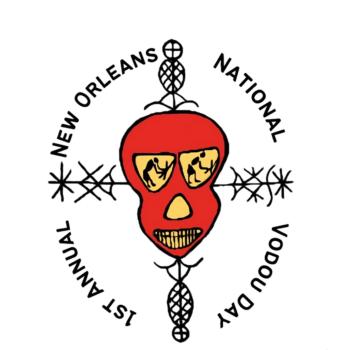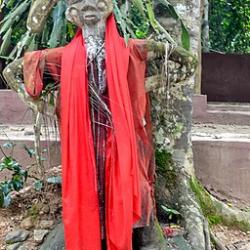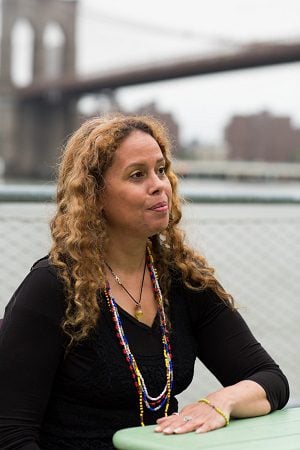
Insights of a Priestess in Publishing is a guest post by journalist Donni Floyd . She conducted the following interview with me, and I am pleased to be able to share it here.
Lilith Dorsey, M.A. is an illustrious authority on all things Mystical; an accomplished academic with an masters in anthropology and film from NYU, she found her life’s calling in the Spiritual. Formally initiated in the practices of Haitian Voodou, New Orleans Voodoo, and Santeria, Dorsey specializes in providing accurate and respectful information on the Afro-Diaspora Religions and practices, writing notable bodies of work such as Voodoo and Afro-Caribbean Paganism, 2004 a much-revered text on the belief system and practices of Voodoo that is often misrepresented, and Love Magic, 2016 a delightful reference guide of spells and recipes to attain, keep and revitalize love from every aspect.
I was a fan well before I met her, admiring her prose and commitment to teaching about the Afro-Diaspora religions and practices when the subject simply wasn’t addressed, or if so, was done with negative rhetoric that was out of context or not factual. When I found that we lived in the same City, (she’s a Brooklynite born and bred) I jumped at the chance to have a reading from her.
Let Hollywood depict a first-time meeting with a Voodoo Priestess, she would be rife with darkness and intimidation, dramatic face paint in all black holding a bloody chicken head. Reality: She had on yoga pants on and a t-shirt, with glasses, an easy smile and a hearty, contagious laugh. Her apartment was warm and and eclectic, vintage furniture with accents of color strategically placed. The sun streamed in through various plants that lined the windows. I sat down on the sofa as she picked up her well-worn cards, and gave me a wonderful, very reassuring reading. I then asked if I could conduct an informal interview with her, to which she graciously agreed.
A week later, we sat down for a teleconference. I was all nerves and again, but Lilith was very easy-going and gracious. We had a 30 minute conversation -here is an excerpt:
So you primarily write about Voodoo and other Spiritual Practices; if you had to choose another genre to write about, what would it be? What lives in your heart besides Spirituality?
L: I think I would enjoy travel writing, you know what I mean? ! I love cooking but I think that’s a little hard to get across, just writing about it… it’s more of an experiential kind of thing. But I really do love travel and I would love to do more of it!
What other writers and journalists in your industry do you admire?
L: Oh that’s an interesting question! I really like the Editor of the Witch’s Almanac [Andrew Theitic] He’s an old friend of mine who took over for an old Witch friend of ours [Elizabeth Pepper, original owner of the Witches’ Almanac who died in 2005] I met him ages ago – I didn’t always live in New York, I left for about 10 years – I met him when I lived in Rhode Island. He just always struck me as a person who was so together, informed and knowledgeable, someone who was kind and compassionate and all those things in one. I really do appreciate his work. It’s not dilettante, he does witchcraft, and all these different things, but he really knows his stuff, which is rare for someone who’s into a bunch of things.
My Editor at Patheos, Jason Mankey, he’s very good. You know, when you’re a journalist, you have to engage your reader, and sometimes the material isn’t as exciting as it should be, and he always manages to make everything really exciting, and I appreciate that about him. He just did a series on Summer Festivals, and for each one, he related a pop song from the seventies! [Laughs] And that’s how he wrote about each festival, it was great! I think my favorite one was “Staying Alive” [Circa Bee Gees 1979] I was like, oh okay, that festival’s been around for 25 years so “Staying Alive” is a great song for that festival! He’s just creative in what he does, and he knows his stuff too!
I love that! Is there an experience that is transformative or life changing for you?
L: I don’t know, there’s so many! I tend not to write about the big things because that’s hard to write about, I tend to write about the little things. People tend to call me out a lot, and I get annoyed, and I go on a rant, and I don’t like to do that…[both of us are laughing] but I feel like those turn out to be my best pieces because they’re really passionate in response. I had a friend that likes to say “ forget about the good teachers – those people that put obstacles in your way, those are the bad teachers and those are the ones who stick with you, push you and make you go further.” I did a post a couple of weeks ago about someone who hadn’t even read my books, [Love Magic, 2016 and Voodoo and Afro-Caribbean Paganism, 2004] and were criticizing them.
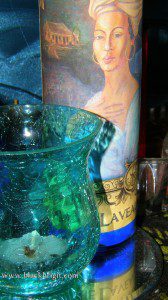
How does that work?? It seems that’s how we roll today, we respond to titles without reading the articles, and satire is taking as face-value truths… it seems it’s where we are as a society and it’s just sad…
L: No it’s true and I think that people don’t really want to think either, you know? Like they just want everyone to think for them. I was revisiting a post I made about St. John’s Eve, and I called it “The Darker Side of Solstice” Saint John’s Eve in New Orleans, it’s the holiest holiday we have – It’s the Marie Laveau Holiday, they used to do it on the longest day of the year, but in New Orleans, you’re not celebrating the day and all this light, it was a nighttime ceremony, about the shortest most concentrated darkness, and readers immediately chimed in “It’s the Solstice! What’s dark about it??” [Laughs}
They obviously never got to the article – Reading is fundamental! [Laughs]
As a journalist, did you go through the traditional submission process? If so, how did that work for you? Did you get something from that process?
L: I wish I could say I did get something from that experience! [Laugh] It used to be that you sent out 50 or 100 submissions and you’d get one acceptance; I’ve been published in Parabola, which is a scholarly journal but I have not been successful in mainstream publications, although I’ve tried. Now most of my work that’s published is because I know the editor and they may say “Hey, we’d really love to have a piece from your perspective because they don’t have enough women, or people of color, or we would like more about your tradition, so that’s been much more successful for me than blind submissions. It’s sort of like submissions for book publishing, it’s across the board in publishing that if people don’t know you, it’s next to impossible to get your work in there and I think that it’s such a shame.
So was this your experience when you published your books? Was it who you knew or where they already familiar with your writing?
L: I think it was a little of both. I had a friend who bought a publishing house and commissioned me to write my first book – Voodoo and Afro-Caribbean Paganism, 2004 – and when that publishing house folded, my friend became my literary agent instead and shopped my book to all the major houses until he got an advance for it. And this was back in 2003, it wasn’t like today where the market is full of hoodoo conjure books and everybody’s an expert.
Yes, it’s really trending right now.
L: Right! And my 2nd book, Love Magic, 2016 I feel like the blog really helped! My editor came to me and said, I read the blog, we really want to see another book from you. So I really do think that you can do it [publishing] yourself! I’m fortunate that my blog [Voodoo Universe] exists on the biggest religious platform in the world, Patheos. It’s not a big thing, I don’t have to answer to anyone, I can write whatever I want, I can be political… I can say four letter words if I want, and if I get “x” amount of readers, I get paid! So I believe anyone who has a message they want to get out there, blogging is the best way to do it.
What are the pitfalls in publishing that you’ve encountered?
L: Well, you know, within every industry there’s networking, personalities, drama; there are jobs I’ve had where someone doesn’t like “this editor” and if I write for them, I won’t get hired for the other job… it just gets really weird, unpacking some of it. And there’s still a lot of prejudice about what I do [being a Voodoo Priestess ] so that makes it very difficult. And incidentally, some publications that have been around for 20 or 30 years are surprisingly disorganized! [laughs]
What is your advice to other aspiring writers and freelancers of color looking to navigate the waters and tell our stories?
L: I would say get out there, network with the people whom you’d want to work with, because that works the best. And again, that’s any industry! [Laughs] It allows you to connect to your people and it allows people to get to know who you are.
This was the brunt of our journalism conversation. I thanked her again for her time and insight. Voodoo Priestess Lilith Dorsey is pretty awesome. I know we only graced the surface of her experiences in journalism; but I was left with a sense that she is a priestess of a thousand adventures. One day, I hope to get her personal account of every single one in a memoir.
As always if you have enjoyed what you find here please remember to like, comment and share !


